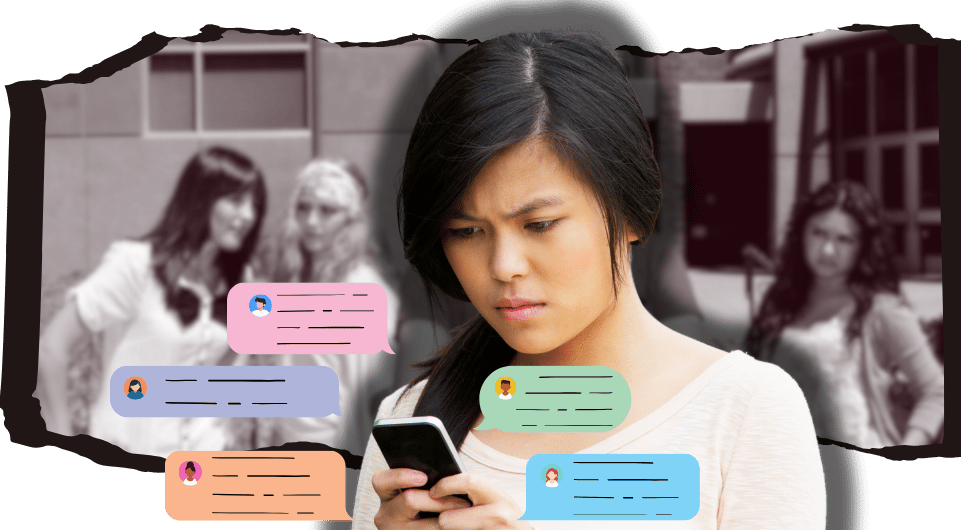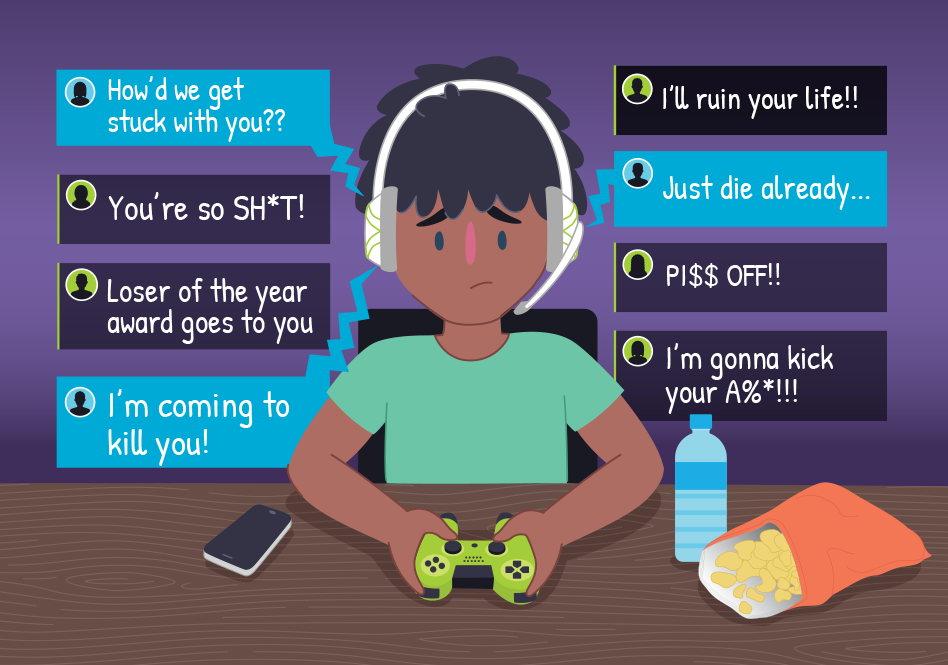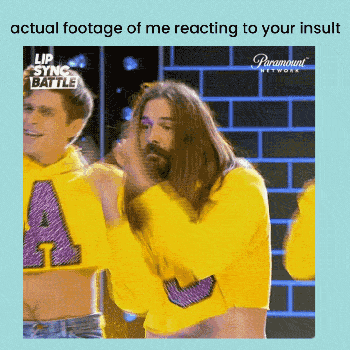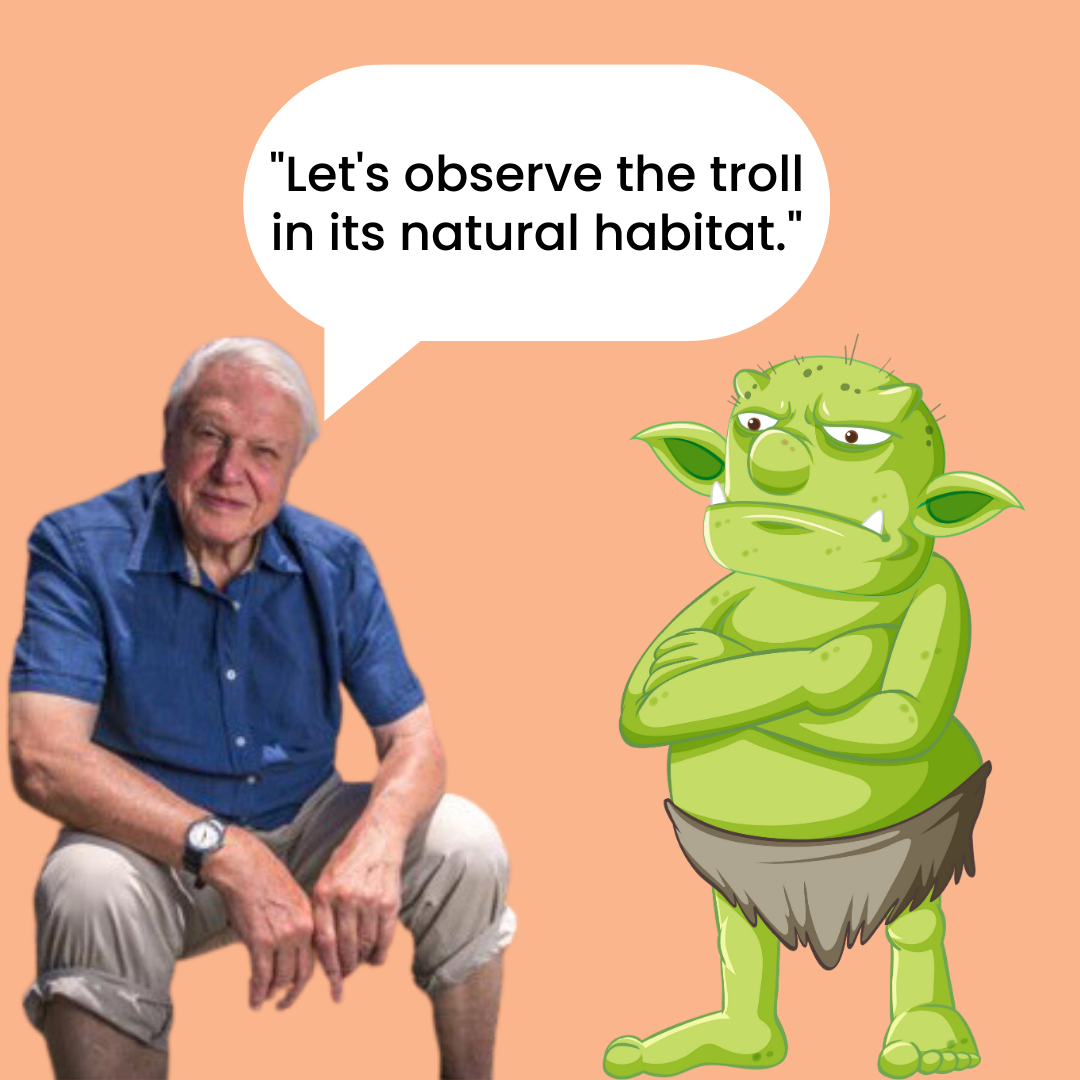Bullying
If you're being bullied, or know someone who is, there are lots ...
READ MEIf you’re experiencing cyberbullying, you’re not alone. It can be upsetting and difficult to escape. Find out what cyberbullying is and what you can do to protect yourself.

Cyberbullying can look like lots of different things and can happen on different technologies, games, sites and apps. If something online brings you down and impacts on your wellbeing, there's stuff you can do and people who can help.

You might have heard of some of these before!
When someone deliberately comments or posts something online with the intent to upset or fight with others. Trolling is only cyberbullying when it’s done with the intention to cause harm.
When someone shares private information about someone else without their permission, such as revealing someone’s gender or sexual identity online.
When a person’s social media accounts are boycotted, ostracised (excluded from the social group) or shunned (ignored) when other’s think they've acted in an unacceptable way. This isn’t always cyberbullying but becomes cyberbullying if it’s used to exclude or isolate others.
When someone deliberately shares someone's personal identity, such as their real name or address, online without their permission.
Leaving someone out deliberately, including uninviting them to online groups, conversations or events.
Sending direct insults to upset someone online.
When someone uses someone’s else's account to post inappropriate content.
When someone makes a fake account with the sole purpose of cyberbullying someone.
Spreading info in public posts or in DMs (direct messages) in order to ruin someone else’s reputation or their relationships with others.
Revenge porn and sextortion are two types of image-based abuse that can also happen online. If you experience revenge porn or sextortion, there are things you can do and people that can help you. For more info, check out this page
Knowing the types of cyberbullying you experience is important, as different responses might be required. E.g. ignoring it is a good response to trolling and flaming, but is not helpful for fraping or masquerading.
If you are being cyberbullied, it's not your fault and there are things you can do.
1. Stay calm
Cyberbullying can trigger a lot of emotions. It's important you don't panic or retaliate as sometimes that can make things worse. It's always a good idea to respond when you are feeling calmer and have a clear mind (we know this is easier said than done!)
2. Screenshot
Take screenshots. It's important to keep the evidence if you have to report. If you find you keep looking at the screenshots or that having these saved are bad for your mental health, send a copy to someone you trust (e.g. a parent) and then delete your own copy.
3. Shut it down
You can block the person and report the cyberbullying to the game, site or app it occurs on. In most cases, cyberbullying is against their terms and conditions of use and should be removed. (Make sure you only block or delete someone after you’ve taken screenshots).
If you are unhappy with the response you get or the cyberbullying is not removed after being reported, you can also report it to eSafety.
4. Support
Report the cyberbullying to more than one trustworthy adult and keep on talking to them until the situation is resolved. You could talk to a parent, a teacher, your school counsellor, another family member and Kids Helpline to name a few.
"If you are dealing with one-off mean comments, it can sometimes be a good idea to respond with kindness and a sense of humour. If you think someone is trolling you and wants you to get emotional or argue with them, ignoring them can stop stuff from escalating."
- Amanda, Kids Helpline Counsellor






Check out some more helpful strategies here.
Reach out to the person being bullied. Check in with them to see if they are ok and let them know what’s happening to them is not cool.
Call out bad behaviour online. This could look like posting a comment or meme saying that you don’t agree with the cyberbullying. 80% of you told us that you wished someone would stand up for you if you were being cyberbullied.
Report it – most games, apps and sites have easy ways to report cyberbullying.
Check in with a trusted adult so they know what's going on. This could be a teacher, parent, older sibling or a counsellor. Remember, we are always here to help.
Here are some other things that can really help!
Bullying
If you're being bullied, or know someone who is, there are lots ...
READ MEOnline Harassment
Being harassed online is a serious form of cyberbullying that is against ...
READ MEStaying safe online
Connecting with family and friends online can be fun and exciting, but ...
READ MERevenge porn and image-based abuse
‘Revenge porn’ is a type of image-based abuse that can happen online. ...
READ METalking helps! We’re here for you.
No problem is too big or too small.
We're here 24 hours a day, 7 days a week